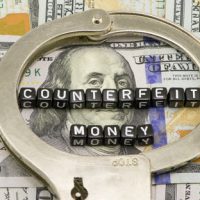Understanding the Legal Risks of Using Counterfeit Currency in Florida

Counterfeiting is one of the oldest white collar crimes prosecuted in the United States. In fact, the United States Secret Service was founded in 1865, not to protect the President from harm, but to investigate and arrest people who manufactured counterfeit coins and bank notes. Today, counterfeiting is much less common than it was back in the 19th century, with only about 0.01 percent of all United States currency in circulation estimated to be fakes.
Mississippi Man Pleads Guilty After Being Found with Gun, Fake $20 Bills in Fast Food Restaurant Parking Lot
That said, you still do not want to be arrested and charged with counterfeiting. It remains a serious federal crime punishable by up to 20 years in prison. Just recently, the United States Attorney’s Office in Tampa announced the successful prosecution of a man for counterfeiting.
According to a plea agreement filed in the case, United States v. Chapman, a Florida sheriff’s deputy was in the parking lot of a fast food restaurant when he walked by a car that smelled of marijuana. The deputy decided to investigate. He approached the driver, who was inside the car, and asked for identification.
It turned out the driver–the defendant in this case–had an active warrant in his native Mississippi on a firearms charge. The deputy therefore detained the defendant. The defendant consented to a search of his vehicle. This search revealed a loaded pistol, a Hewlett Packard printer, and what was described as “multiple pages of counterfeit $20 Federal Reserve notes.”
The defendant proceeded to make a voluntary statement to the police. He admitted that the firearm and the counterfeit notes belonged to him. He admitted to printing the counterfeit notes to purchase items as he traveled to Florida from Tennessee. Indeed, law enforcement discovered the defendant actually used one of his counterfeit $20 notes to purchase food from the nearby fast food restaurant.
It also turned out the defendant had a prior felony conviction in Tennessee for aggravated assault. This led a federal grand jury to indict the defendant, not just for counterfeiting but also being a felon in possession of a firearm. Rather than go to trial, the defendant negotiated a plea agreement with the United States Attorney. In exchange for pleading guilty to the gun possession and counterfeiting charges, the government agreed to a favorable sentencing recommendation. He must also forfeit the firearm and his printer seized at the time of his arrest.
The defendant has been detained since his arrest in February 2024. A final sentencing hearing is scheduled for November 2024.
Contact the Joshi Law Firm Today
Criminal counterfeiting charges require the government to prove that the defendant used, made, or possessed counterfeit currency “with the intent to defraud another.” This means that a person cannot be convicted of counterfeiting if they honestly did not know their money was fake. Another possible defense is that the money clearly looked fake, such as would be the case with “Monopoly” money, and that no person would ever be fooled into thinking it was real.
If you are facing counterfeiting or similar white collar criminal charges and need legal advice on how to defend yourself, call the Orlando white collar crimes lawyers at Joshi Law Firm, PA, today at 844-GO-JOSHI or contact us online to schedule a free initial consultation.
Source:
justice.gov/usao-mdfl/pr/mississippi-man-pleads-guilty-firearm-and-counterfeiting-charges

